Una campagna di Gabriele Del Grande
ContattiRecupera la tua password
Inserisci il tuo indirizzo email: ti invieremo una nuova password, che potrai cambiare dopo il primo accesso.
Password inviata
Controlla la tua casella email: ti abbiamo inviato un messaggio con la tua nuova password.
Potrai modificarla una volta effettuato il login.
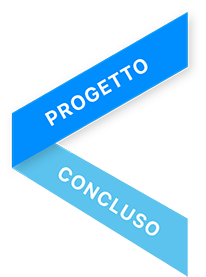
Un partigiano mi disse
- Raccolti € 47.918,00
- Obiettivo € 38.000,00
- Sostenitori 1342
- Scadenza Terminato
- Modalità Raccogli tutto Informazioni
Raccogli tutto
Il tuo contributo servirà a sostenere un progetto ambizioso. Scegli la ricompensa o la somma con cui vuoi sostenerlo e seleziona il metodo di pagamento che preferisci tra quelli disponibili. Ti ricordiamo che il progettista è il responsabile della campagna e dell'adempimento delle promesse fatte ai sostenitori; sarà sua premura informarti circa come verranno gestiti i fondi raccolti, anche se l'obiettivo non sarà stato completamente raggiunto. Le ricompense promesse sono comunque garantite dall’autore.
- Categoria Libri & editoria
Il Progetto
ENGLISH VERSION
Da uno dei tre registi di "Io sto con la sposa" e fondatore di Fortress Europe

Il crowdfunding per il nuovo libro di
Gabriele Del Grande
La guerra in Siria e la nascita dell'ISIS
raccontate attraverso l'epica della gente comune
in un intreccio di geopolitica e storytelling.
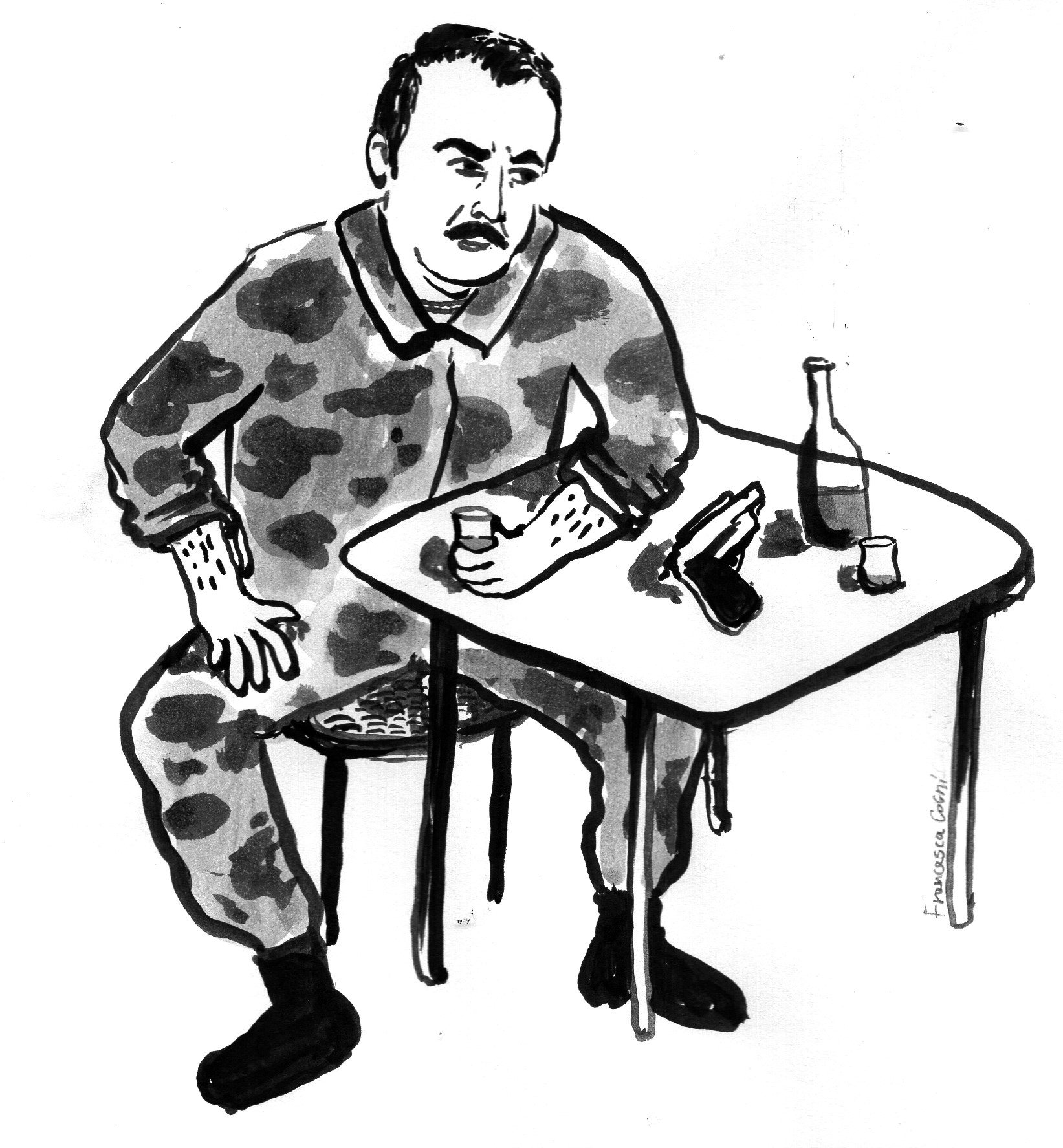

La prima volta me lo disse un partigiano siriano ad Aleppo. Era una notte di Settembre di tre anni fa. Chiusi dentro uno scantinato di Ashrafiyya durante un bombardamento, ingannavamo il tempo con una buona bottiglia di araq, mentre fuori, feroce, infuriava una guerra sempre più insensata. Insieme, condividevamo molto di più del rischio della vita. Condividevamo il sogno della rivoluzione e della fine dalla dittatura. Un sogno che però stava prendendo la piega di un incubo.
“Facile giudicare da fuori. Facile scappare all'estero e dire che dovevamo continuare con le manifestazioni. Hanno ammazzato migliaia di persone nelle manifestazioni e altrettante le hanno fatte fuori in prigione! Cosa dovevamo fare ancora? Lasciarci ammazzare tutti? Andare con le rose davanti ai carri armati? Ditelo a chi ha perso i figli sotto le bombe! A chi è stato torturato per mesi! A chi ha perso gli amici più cari! La lotta armata era l'unica cosa giusta da fare. Eppure, guarda dove ci ha portato...”
Quella sera, il partigiano non era sceso al fronte. Né ci sarebbe andato l'indomani. Ne aveva abbastanza dei ladroni di Afash e delle loro rapine in nome della rivoluzione. Ne aveva abbastanza dei bombardamenti di Hayyani sui civili dei quartieri lealisti perché tanto erano solo dei fottuti curdi, cristiani o alawiti. E ne aveva abbastanza dei salafiti e dei qaedisti che ormai dettavano legge nelle zone liberate e che avevano trasformato la rivoluzione siriana in una rivoluzione islamica asservita all'agenda dei servizi turchi, qatarini e sauditi.
“Quando ho impugnato le armi contro Asad sapevo di andare incontro alla morte. Ma ho sempre pensato che sarei morto felice, che sarei morto combattendo per la libertà, che il sacrificio della mia vita sarebbe servito a dare un futuro migliore a mio figlio.”
Sulla parola figlio andò in crisi. Mordersi il labbro inferiore fu inutile. Gli occhi erano già pieni di lacrime. Con un gesto di stizza buttò la pistola sul tavolo e si abbandonò ai singhiozzi coprendosi il volto con le mani nude. Quindi, dopo un lungo respiro, mi fissò finalmente sincero e disse:
“La verità, Gabriele, è che morirò invano. Perché mio figlio mi tradirà! Sarà solo a piangere sulla mia tomba e per vendicare il mio sangue e il sangue di mezzo milione di morti di questa guerra maledetta, verrà a seminare la morte in Europa. E quando si farà esplodere in un aeroporto e ucciderà i tuoi figli, tu non potrai biasimarlo perché siete rimasti indifferenti per anni mentre qua massacravano noi.”
Avrei voluto rispondergli qualcosa, fare dei distinguo... Invece niente. Mi scolai il bicchiere e rimasi in silenzio a pensare. Nelle sue lacrime leggevo la sconfitta di un intero popolo. E intuivo che quella sconfitta sarebbe presto diventata la mia e la nostra. Era soltanto una questione di tempo. Perché tutto è legato in questo piccolo mare.
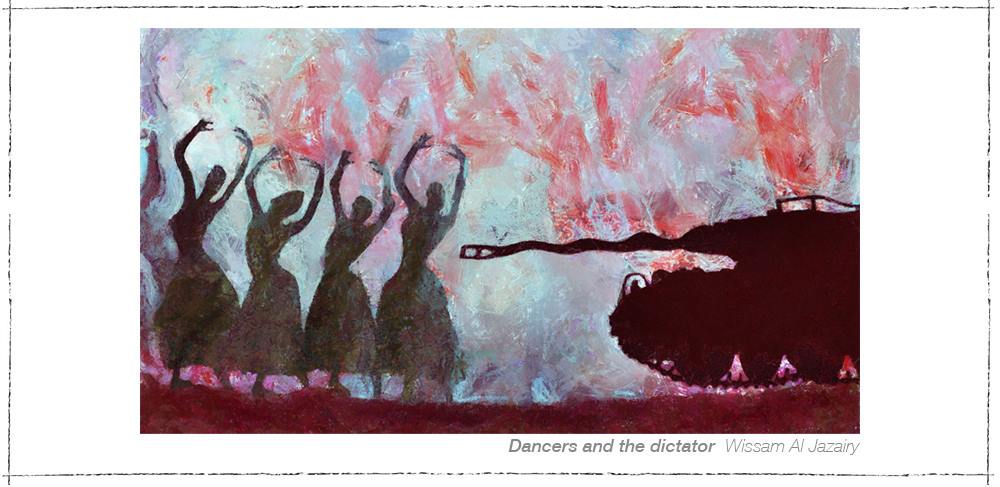

Un mese dopo, di ritorno in Italia, mi improvvisai contrabbandiere. Insieme ai miei fratelli Antonio Augugliaro e Khaled Al-Nassiry, insieme alle nostre compagne e ad un gruppo di carissimi amici mettemmo in piedi un finto corteo di nozze per portare in Svezia cinque amici palestinesi e siriani da poco sbarcati a Lampedusa. Filmammo tutto e ne venne fuori “Io sto con la sposa”, una delle più grandi avventure formative della nostra storia e della storia delle migliaia di persone che ci aiutarono a produrre e a distribuire il film.
Era la mia personale risposta al partigiano di Aleppo. Non eravamo tutti indifferenti. Potevamo ancora fare qualcosa. Potevamo vivere insieme e insieme ridere e piangere e lottare. Fu un successo insperato: centinaia di migliaia di spettatori nei cinema di cinquanta Paesi e milioni di telespettatori sul satellite in tutto il mondo. Un successo che fin dall'inizio mal sopportavo. Perché sapevo che non avremmo salvato una sola vita.

Il mio senso di impotenza cresceva col passare del tempo. L'uscita del film nelle sale coincideva con la fase di massima espansione dello Stato Islamico in Iraq e in Siria. Mentre sfilavamo sul red carpet di Venezia, erano ancora fresche le notizie dei massacri degli yazidi in Iraq. Gli Stati Uniti, presto seguiti da Francia e Gran Bretagna e da una coalizione di paesi arabi, si decisero a bombardare Mosul e Raqqa.
La reazione dell'Isis fu brutale. Prima giustiziarono in mondovisione gli ostaggi americani e britannici che detenevano, quindi lanciarono una lunga serie di attentati internazionali che nel giro di due anni avrebbero colpito Francia, Belgio, Tunisia, Egitto, Libia, Nigeria, Somalia, Yemen, Libano, Turchia, Pakistan, Afghanistan, Bangladesh...
La profezia del partigiano di Aleppo si era avverata. La guerra era uscita dai confini della Siria. Il sangue aveva portato altro sangue. Proprio come accadeva ininterrottamente dai primi anni Novanta, da quando cioè Stati Uniti e Arabia Saudita avevano voltato le spalle all'internazionale qaedista di Bin Laden, Azzam e Zawahiri che fino ad allora avevano invece supportato, insieme ai servizi pakistani, per dare manforte ai mujahidin afgani armati dalla CIA per cacciare i russi da Kabul.
Ma guai a scomodare la storia, a parlare della sporca guerra, dei suoi eserciti e delle sue tattiche. I commentatori nostrani sanno soltanto sciorinare a memoria il verbo dello scontro di civiltà e il rassicurante quanto vuoto racconto della lotta del bene contro il male, dell'umanesimo contro la barbarie. D'altronde nessuno di loro ha mai messo piede in Siria, nessuno ha mai visto la guerra né ha mai parlato con i diretti interessati. Figuriamoci se abbiano mai sentito la storia delle pecore.
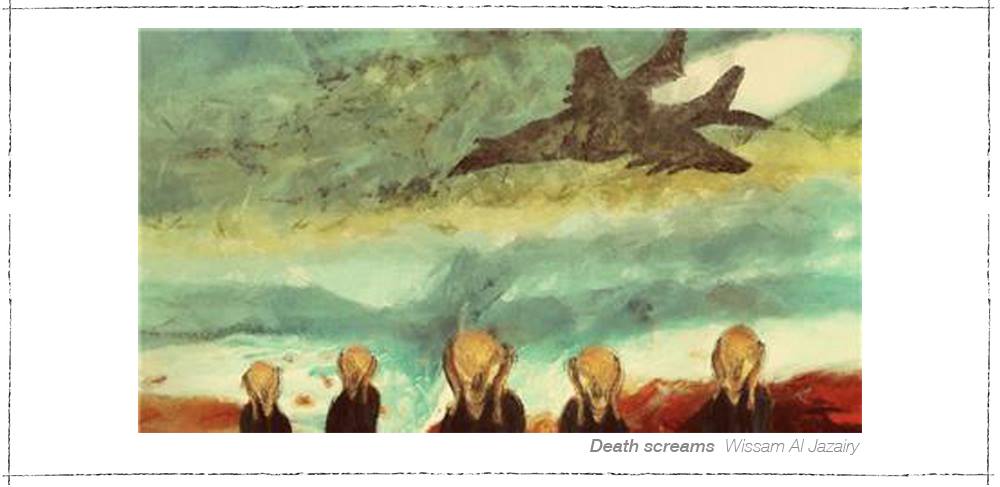

Correva l'anno 2003. Stati Uniti e Gran Bretagna avevano da poco occupato Baghdad e deposto il regime di Saddam Hussein, quando all'improvviso le pecore divennero uno dei beni più preziosi sulla borsa del contrabbando tra Iraq e Siria. Da Al-Bukamal ne passavano migliaia ogni giorno. E sotto ogni pecora c'era legato un kalashnikov trafugato dagli arsenali del dismesso e sconfitto esercito ba'athista iracheno.
Le armi erano dirette ad Aleppo, nei campi d'addestramento dei jihadisti di sheykh Abu Qaqaa, una sorta di pop-star del movimento salafita siriano, personaggio vicino ad Al-Qaeda nonché ai servizi segreti di Asad che usavano lui e i miliziani che inviava oltreconfine a Zarqawi, per destabilizzare l'Iraq occupato dal comune nemico americano.
Il business delle pecore andò avanti fino al 2005 quando, in seguito all'omicidio di Hariri a Beirut, Asad fu convinto dagli americani a rompere con Al-Qaeda. Abu Qaqaa si tagliò la barba, cambiò vita e finì a Damasco sotto la protezione dei servizi. I suoi jihadisti invece vennero arrestati a migliaia e rinchiusi nel carcere di massima sicurezza di Sednaya, a nord di Damasco, dove sarebbero rimasti a marcire per anni, fino a quando il regime non avrebbe avuto di nuovo bisogno di loro.
Accadde nella primavera del 2011. La Siria era attraversata da proteste di massa senza precedenti. I morti in piazza non facevano più paura alle fiumane di gente che riempivano le piazze chiedendo la fine dei quarant'anni di dittatura degli Asad al grido di “rivoluzione”. Con il paese già messo a soqquadro da scontri e tensioni, gli oscuri manovratori dei servizi segreti siriani svuotarono la prigione di Sednaya, rimettendo in libertà i salafiti e i qaedisti più pericolosi con il chiaro obiettivo di radicalizzare il movimento, dividere l'opinione pubblica e schiacciare la protesta con le armi. Una strategia della tensione che però sarebbe presto sfuggita di mano sia per l'interventismo turco, qatarino e saudita, sia per la rinascita dello Stato Islamico nel vicino Iraq in seguito al ritiro delle truppe americane e alle fallimentari politiche settarie del governo di Al-Maliki.
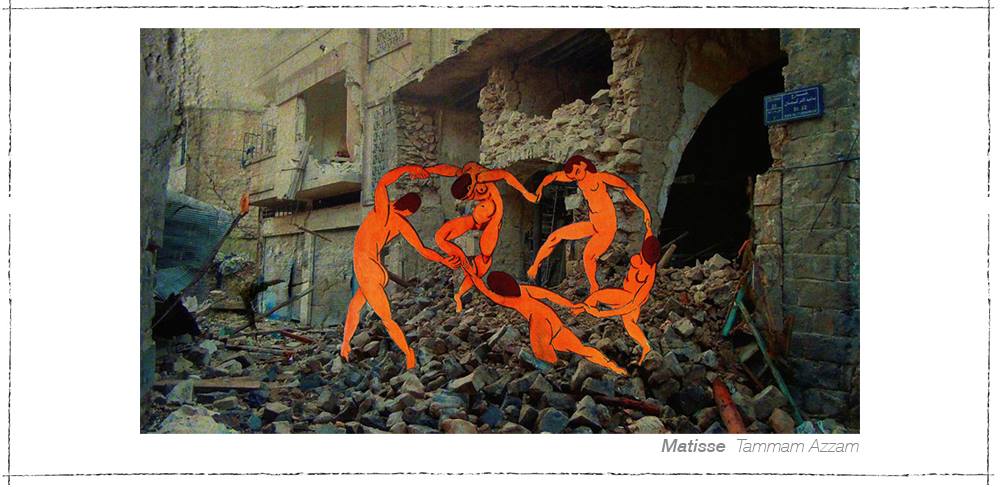

Ho conosciuto di persona uno dei contrabbandieri di pecore di Al-Bukamal lo scorso aprile in Turchia insieme a decine di fuggiaschi di Raqqa e Deir Ezzor. Uomini e donne dalle storie eccezionali. Sopravvissuti tre volte alla repressione della dittatura, alla ferocia della guerra e al regime degli uomini in nero. Da quel viaggio sono tornato con un registratore pieno di interviste, un centinaio di pagine di sbobinature, un mare di domande nella testa e l'urgenza, mai così forte, di tornare a scrivere.
Mi sembra l'unica cosa sensata da fare. Dopotutto con “Io sto con la sposa” non avremo salvato una sola vita, ma è pur vero che abbiamo salvato una storia. E col senno di poi ha lo stesso valore. Perché abbiamo contribuito a tenere in piedi un orizzonte verso cui camminare, a tramandare un discorso sull'umanità di questo nostro Mediterraneo, sulle sue sfumature, la sua storia e il suo futuro possibile, in cui riconoscerci. Adesso si tratta di fare lo stesso.
Il libro che ho in mente racconterà la guerra in Siria e la nascita dello Stato Islamico attraverso un grande progetto di giornalismo narrativo che intrecci l'epica della gente comune alla storia di questi vent'anni di guerre e terrorismo.
Perché di Isis si parla ogni giorno, ma in pochi ci hanno davvero capito qualcosa. Chi sono gli uomini e le donne che a migliaia si arruolano per difendere il Califfato? Chi sono i civili rimasti nelle loro città? Ma soprattutto: come si è arrivati a tutto questo?
È quello che mi chiedo ed è quello che vorrei provare a raccontare nel libro, mischiando geopolitica e storytelling, analisi e ritratto in una sorta di romanzo del reale.

Per il crowdfunding abbiamo 60 giorni di tempo. Dopodiché partirò per un anno di ricerca. Sei mesi di viaggi (tra Turchia, Libano, Siria, Iraq, Tunisia e Libia) e sei mesi di scrittura. Il libro dovrebbe essere sugli scaffali dalla fine del prossimo autunno. Nel frattempo pubblicherò sui social i diari dei miei viaggi e qualche estratto delle storie più interessanti.
Qualche editore interessato all'operazione c'è già. Si tratterà, una volta raccolto il materiale, di scegliere l'offerta migliore in termini di distribuzione e di traduzioni all'estero. Perché come con “Io sto con la sposa”, la grande sfida sarà uscire dalla nicchia e portare al grande pubblico una storia indipendente, e per certi versi sovversiva, completamente prodotta dal basso.

Perché sono stato cinque volte in Siria dall'inizio della guerra, parlo correntemente arabo, seguo quotidianamente gli sviluppi del conflitto, ho alle spalle dieci anni di inchieste nel Mediterraneo, un blog citato sulla stampa di tutto il mondo, tre libri e un film che fa ancora parlare di sé.
In un paese normale il mio curriculum basterebbe a farmi commissionare questo lavoro da un giornale o da un grande editore. Ma l'Italia non è un paese normale. Per un periodo ho creduto che la visibilità internazionale che mi ha dato il film avrebbe cambiato le cose. Non è andata così. E non mi sembra un buon motivo per mollare. Al contrario.
Sarà sicuramente molto più faticoso, ma anche più avvincente, mi aiuterà a restare me stesso e a costruire un rapporto vero con il mio pubblico, che poi è una comunità di persone reali a cui io stesso appartengo per la mia storia.
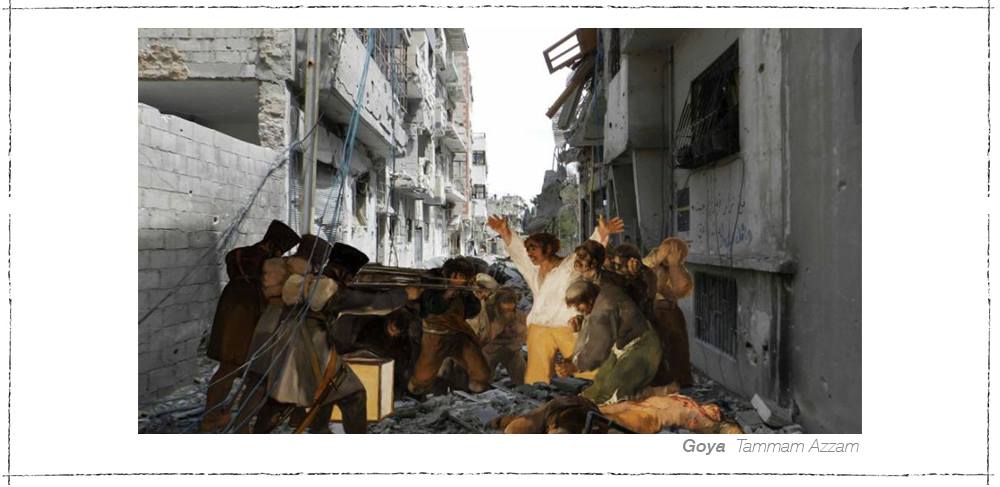

Siamo giovani, cosmopoliti, curiosi, inguaribili idealisti, solidali e avventurieri. Tenuti insieme dal nostro sguardo sul mondo, dalle nostre lotte e dall'amore per il nostro Mediterraneo. E siamo tanti: migliaia di persone in Italia e nel mondo. Così tanti che siamo diventati una rete senza nemmeno rendercene conto.
Questa non è la prima volta che ci ritroviamo intorno a una campagna. Nel mio piccolo è già successo in passato con Fortress Europe, con i miei tre libri e, da ultimo, con il nostro film “Io sto con la sposa”. E ogni volta è stata l'occasione per scardinare il discorso pubblico, per far circolare le nostre idee, per riscrivere il nostro racconto del mondo e provare a portarlo dentro il mainstream.
Dato che non ho bisogno di interpreti e che lavoro spesso senza fixer, ho messo in preventivo 1.800 € a viaggio per 6 trasferte di 15 giorni l'una. Per la ricerca e la scrittura invece ho preventivato una borsa di studio della durata di un anno di 1.400 € mensili (che al lordo delle tasse diventano circa 2.250 €). Insieme, borsa e viaggi costano 38.000 €.
Affinché il progetto parta, ho bisogno di anticipare con il crowdfunding almeno il 50% del budget. Se invece, come sono sicuro, riusciremo a coprire il 100% dei costi, mi impegno personalmente a versare il 10% di tutte le vostre donazioni a progetti umanitari in Siria e a tenervi aggiornati su come saranno utilizzati i fondi.
Infine, se dovessimo superare quota 38.000 €, una volta recuperate le spese per le commissioni di Produzioni Dal Basso (5%) e PayPal (3%) e le spese per la produzione e l'invio dei premi (15%), ogni euro in più sarà investito in traduzioni e distribuzione all'estero del libro.

Dietro questo progetto ci sono soltanto io. Ma prendetelo lo stesso come le prove generali. Perché se tutto va bene, tra uno o due anni si replica e lo si fa in modo collettivo. Coinvolgendo scrittori, fotografi, videomaker, disegnatori, registi di cinema e di teatro su un progetto più grande. Magari dopo un bel concorso di idee. E se va bene anche quello, al prossimo giro troviamo il coraggio di lanciare finalmente il giornale online che manca a tutti noi!
ENGLISH VERSION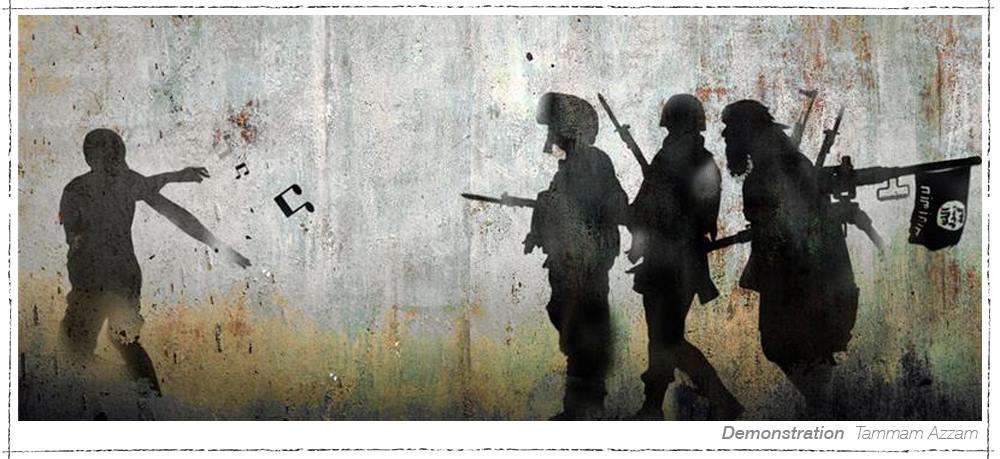
By one of the three directors of “On the Bride’s Side” and founder of Fortress Europe
A PARTISAN TOLD ME
The crowdfunding for the new book by
Gabriele Del Grande
The war in Syria and the birth of ISIS
narrated through the epic stories of common people
weaving together geopolitics and storytelling.

MY SON WILL BETRAY ME
The first time I heard these words was from a Syrian partisan in Aleppo. It was a night in September three years ago. Barricaded in a cellar in Ashrafiyya during a bombing, we were killing time with a good bottle of araq, while outside, an increasingly senseless war was raging. Together we shared much more than just risking our lives. We shared the dream for the revolution and for the end of the regime. A dream that was turning into a nightmare.
“It’s easy to judge from the outside. It’s easy to escape abroad and say that we should’ve continued with the protests. They killed thousands of people in the protests and just as many in the prisons! What else should we have done? Let ourselves get killed? Face the tanks with roses in our hands? Go tell the ones who lost their children under the bombs! The ones who were tortured for months! The ones who lost their dearest friends! To take up arms was the only right thing to do. For all the good it has done to us…”
That evening the partisan had not gone to the frontline. Nor would he have gone the next day. He had enough of Afash’s thieves and of their robberies in the name of the revolution. He was sick of Hayyani’s bombing on civilians in the loyalist neighborhoods, because anyway they were just bloody Kurds, Christians or Alawits. And he had enough of the salafis and jihadists who were ruling in the freed zones and who had turned the Syrian revolution into an Islamic revolution subservient to the agenda of Turkish, Qatari and Saudi secret services.
“When I took up arms against Asad I knew I was facing death. But I always thought I would die happy, that I would die fighting for freedom, that my life’s sacrifice would have helped to give my son a better future.”
On the word son he went to pieces. Even biting his lower lip was useless. His eyes were already full of tears. With an irritated gesture he threw the gun on the table and started sobbing after covering his face with his bare hands. Then, after a heavy sigh, he looked at me, with sincerity and said: “The truth is, Gabriele, that I will die in vain. Because my son will betray me! He will weep alone over my grave and in order to take revenge for my death and for the deaths of half a million people in this dirty war, he will come and spread death in Europe. And when he blows himself up in an airport killing your children, you won’t be able to blame him because you remained indifferent for years while here they were massacring us”.
I would have liked to say something, to make some distinctions…instead nothing. I guzzled down the glass and remained thoughtful and silent. In his tears I read the defeat of an entire population. And I realized that, that defeat would soon become my own, our own. It was just a matter of time. Because everything is interlinked in this small sea.
A PERSONAL MATTER
A month later, back in Italy, I unexpectedly turned myself into a smuggler. Together with my “brothers” Antonio Augugliaro and Khaled Al-Nasiry, along with our partners and a dear group of friends we organized a fake wedding convoy to take five Palestinian and Syrian friends all the way up to Sweden soon after they had disembarked in Lampedusa. We filmed everything and the result was “On the Bride’s Side”, one of the most transformative adventures of our lives and of the lives of the thousands of people that helped us produce and distribute the film.
It was my personal response to the partisan of Aleppo. We were not all indifferent. We could still do something. We could live together and together laugh and cry and fight. It was an unhoped-for success: hundreds of thousands of spectators in the cinemas of fifty different countries and millions of viewers on satellite TV around the world. A success that since the beginning made uneasy. Because I knew that we would have not saved a single life.
A BRIDE IS NOT ENOUGH
My sense of impotence grew as time went by. The film’s release in the cinemas coincided with the moment in which the Islamic State had reached its maximum expansion in Iraq and Syria. While we were walking down the red carpet in Venice, the massacres of the yazidis in Iraq was still fresh news. The United States, soon after followed by France and Great Britain and by a coalition of Arab states, took the decision to bomb Mosul and Raqqa.
Isis’s reaction was brutal. They began by executing in front of TV viewers worldwide American and British hostages, then they orchestrated a series of international attacks that in the following two years would hit France, Belgium, Tunisia, Egypt, Libia, Nigeria, Somalia, Yemen, Lebanon, Turkey, Afghanistan, Bangladesh…
The prophecy of the partisan in Aleppo had come true. The blood had called for more blood. Exactly as it had been happening since the ’90s, that is since the United States and Saudi Arabia had turned their backs on the international jihadist network of Bin Laden, Azzam and Zawahiri after they had long supported them, along with the Pakistani secret services, to help the Afghan mujahedins armed by the CIA in order to expel the Russians from Kabul.
But hardly anyone dares question history, talk about the dirty war, about its armies and its strategies. Our commentators only know how to reel off platitudes about the clash of civilizations and the reassuring, albeit empty, story of the struggle between good and evil, of humanism against barbarity. After all none of them has ever set foot in Syria, none of them has ever seen the war, nor has any of them ever spoken with the people themselves. How could they have ever heard about the sheep.
SHEEP AND KALASHNIKOV
It was back in 2003 when the United States and Great Britain had recently occupied Bagdad and overthrown Saddam Hussein’s regime, when suddenly sheep became one of the most precious commodity on the smugglers’ market between Iraq and Syria.
Thousands of them were passing through l-Bukamal everyday. And underneath every sheep there was a kalashnikov smuggled in from the arsenal of the disbanded and defeated ba’athist Iraqi army.
The weapons were directed to Aleppo, destined to the training camps of the jihadists of sheykh Abu Qaqaa, some sort of pop-star of the Syrian salafi movement. A personality close to Al-Qaeda and also to Asad’s secret service, who used him and the militants he was sending beyond the border to Zarqawi, to destabilize Iraq which was occupied by the enemy they had in common, the Americans.
The sheep’s business continued until 2005 when, following the assassination of Hariri in Beirut, Asad was convinced by the Americans to break with Al-Qaeda. Abu Qaqaa shaved off his beard, he changed his life and ended up in Damascus under the protection of the secret service. Thousands of his jihadists were arrested and then locked up in the maximum security prison of Sednaya, north of Damascus, where they would have remained to rot for years, had the regime not needed them once again.
It happened in the spring of 2011. Syria was being shaken by unprecedented mass protests. The stream of people in the streets was no longer scared of the dead all around and demanded the end of forty years of Asad dictatorship shouting “revolution”. With the country in disarray as a result of clashes and tensions, the shady masters of the Syrian secret service emptied the prison of Sednaya, freeing the most dangerous salafites and qaedists with the clear objective of rendering more radical the movement, dividing the public opinion and crushing with arms the protests. A strategy based on the ever deepening tensions which however soon got out of hand as a result of the intervention by Turkey, Qatar and Saudi Arabia, as well as a consequence of the rebirth of the Islamic State in neighboring Iraq after the withdrawal of the American forces and the failed sectarian policies of the Al-Maliki government.
SAVING A STORY
I personally met one of the sheep smugglers at Al-Bukamal last April in Turkey together with dozens of refugees from Raqqa and Deir Ezzor. Men and women with extraordinary stories. Three times survivors, of the repression from the dictatorship, of the savagery of the war and of the regime of the men in black. I returned from that trip with a tape-recorder full of interviews, hundreds of pages of transcription, an endless number of questions in my head and the urgent need, never so strong, of starting writing again.
It seems to me the only sensible thing to do. After all, thanks to “On the bride’s side” we may not have saved a life, but we certainly saved a story. Which, in hindsight, has the same value. Because we helped sustain a dream to which aspire, pass on an idea of the humanity of our Mediterranean, of its nuances, its history and its possible future in which we can identify. And now the same thing needs to be done.
The book I have in mind will tell the story of the war in Syria and the birth of the Islamic State through a great project of narrative journalism which weaves the epic stories of the common people into the history of the last twenty years of war and terrorism. Because Isis is talked about every day, but very few people have really understood what it is all about. Who are the men and the women who in their thousands have joined to defend the Caliphate? Who are the civilians who stayed behind in their towns? But above all: how did we get here?
This is what I ask myself and this is what I will try to tell in my book, weaving together geopolitics and storytelling, analysis and portrayal, as in a kind of a real life novel.
THE PLAN
For the crowdfunding we have 60 days at our disposal. After that I will set off for a one year research. Six months travelling (Turkey, Lebanon, Syria, Iraq, Tunisia and Lybia) and six months writing. The book should be in the bookshops by the end of next autumn. In the meantime I will publish through the social networks the diaries of my travels and some excerpts from the most interesting stories.
There already are some editors interested in the project. Once all the material is consolidated, it will be a matter of choosing the best offer in terms of distribution and translations abroad. Because, as it happened with “On the bride’s side”, the biggest challenge is to get out of the niche and present to the public at large an independent and somewhat subversive story, produced entirely through crowdfunding.
WHY ME
Because I have been five times in Syria since the beginning of the war, I speak Arabic fluently, I follow the developments of the conflict on a daily basis, I have ten years experience in reporting about the Mediterranean, a blog which is quoted in the press all over the world, three books and a film which is still talked about.
In a normal country my curriculum would be enough to get a commission for this project from a newspaper or from an important editor. But Italy is not a normal country. For a while I believed that the international visibility I enjoyed thanks to the film would change things. But it didn’t. However this is not a good reason to give up. On the contrary.
It will surely be harder, but also more exciting, it will help me to remain who I am and to build a real relationship with my public, which is in effect a community of real people to which I too belong thanks to my history.
WHY US
We are young, cosmopolitans, curious, incurable idealists, caring and adventurous. Kept together by our outlook on the world, by our struggles and our love for our Mediterranean. And we are many: thousands of people in Italy and all over the world. We are so many that we have become a network without even realizing it.
This is not the first time that we get together for a campaign. In my limited way it has already happened in the past with Fortress Europe, with my three books and, lastly, with our film “On the Bride’s side”. And every time it has been a question of deconstructing the public discourse, in order to broadcast our ideas, to rewrite our story of the world and to try and bring it within the mainstream.
BUDGET
Since I do not need interpreters and I often work without fixer, I have estimated a cost of €1.800 per trip for 6 assignments of 15 days each. With regard to the research and the writing instead, I have estimated a grant of the duration of one year of €1.400 on a monthly basis (which, including taxes, means €2.250).
In total, grant and travels will cost €38.000. In order for the project to begin, I need an advance through crowdfunding of at least 50% of the budget, that is €19.000. Otherwise it is a non-starter.
If, however, as I believe, we will manage to cover 100% of the costs, I commit myself to give 10% of all your donations to humanitarian projects in Syria and to keep you updated on how the funds will be used.
Lastly, if we exceed the target of €38.000, after we recover the costs related to the commissions for Produzioni Dal Basso (5%) and PayPal (3%) and the costs for the production and the shipping of the prizes (15%), each euro more will be invested in translations and distribution of the book abroad.
AND IF ALL GOES WELL
I am the only person behind this project. But nevertheless consider it as a rehearsal. Because, if all goes well, in a year or two there will be a repeat performance but a collective one. Drawing in writers, photographers, videomakers, illustrators, cinema and theatre directors in a much bigger project. Possibly after an interesting contest of ideas. And if that too goes well, next time we will find the courage to finally launch the newspaper online which we all miss!

Commenti (168)